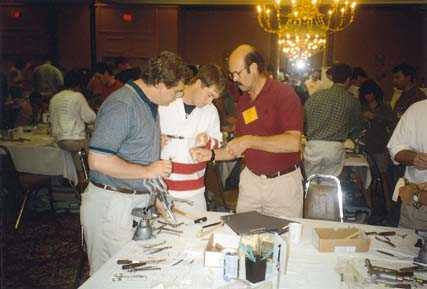
Peter Trafton (R) instructs an AONA Resident's Course
AONA Supports the Coalition for American Trauma Care
by Peter Trafton, M.D.
 Peter Trafton (R) instructs an AONA Resident's Course |
The Coalition for American Trauma Care (CATC) is a public policy advocacy organization devoted to improving trauma care, education, and research in the United States. Based in Reston, VA, near the NIH, other federal agencies, and Congress, the CATC monitors policy issues that might impact the work of trauma surgeons and other trauma care providers.
This unique group has trauma advocacy as its sole purpose. The CATC works together with representatives of surgical, medical and other organizations to educate policy makers about trauma care. However, unlike other groups, it is not constrained by a need to represent the viewpoints of physicians and surgeons who may be less interested in the needs of trauma surgeons and their patients. For the past several years, AO North America has significantly supported the CATC, to gain effective public policy advocacy for our members and their patients. Through the CATC we are privileged to join with our colleagues in other specialties, to add the viewpoints of those who treat musculoskeletal injuries, typically present in more than half of all trauma patients.
The CATC's board, including Dr. Andrew Burgess, representing the Orthopaedic Trauma Association, and Dr. Peter Trafton, representing AONA, is presided over by Dr. Howard Champion, a general surgeon specializing in trauma care. Marcia Mabee, MPH, PhD, is Executive Director of the CATC. Organizations that support the CATC include the American Association for the Surgery of Trauma (AAST), the American Burn Association, and the Eastern Association for the Surgery of Trauma. Their representatives, and a group of distinguished trauma surgeons as At-Large Members, guide this unique organization's efforts.
Effective advocacy requires persistence- the long-term visible presence and activity of an organization's spokespeople. Dr. Mabee is well known and respected on Capitol Hill, and among policy "movers and shakers" in Washington. When appropriate, she arranges for CATC testimony before legislative committees, and helps ensure that trauma surgeons' input is heard. The CATC is ideally positioned to identify opportunities for funding trauma care needs, and to spread word of such opportunities to its members.
CATC activities in 1999 included support for trauma-related programs of NIH, AHCPR, CDC Center for Injury Prevention and Control, Preventive Health/Health Services Block Grants, Children's Emergency Medical Services, and Traumatic Brain Injury Research - all of which achieved increased funding. The Senate report accompanying the FY 2000 Labor-HHS-Education Appropriations bill includes CATC-sponsored language supporting increased funding for trauma training and research, through the NIH and National Institute of General Medical Sciences. CATC has also provided support for clinical research, for managed care reform to ensure paid access to emergency treatment, for BBA relief for academic health centers, for funding of military medical research in civilian centers, and for improved emergency communications, and is working on restoring funding for the Trauma Care Systems Planning and Development Act.
The CATC's bi-weekly reports, as
well as timely legislative alerts, are presented on the AAST's web site (http://www.aast.org/coalition.html), and are posted regularly on the OTA's e-mail list-server. (To subscribe, send an e-mail message to listproc@lists.missouri.edu. Leave the subject line blank. The message should read "subscribe ORT-L